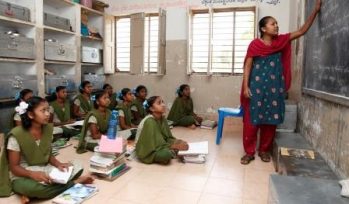This blog was written by Lina Adinolfi, Freda Wolfenden and Saraswati Dawadi from the Centre for the Study of Global Development, The Open University, UK. It is based on a presentation given at the 2023 UKFIET conference.
Over the last twenty years much attention has been given to the assessment of learning at school and university, as evidenced by the shift to assessment for learning from assessment of learning. Reflecting this increased focus on this area, Teacher Professional Development (TPD) programmes include considerable support to teachers to improve how they use assessment with their pupils. But how much thought is given to the design and evaluation of assessment within those TPD programmes themselves? How are the affordances of digital technologies utilised in TPD-related assessment activities? And to what extent do teachers have agency in the assessment process?
‘Not much’ is the short answer from our recent exploratory study, which examined – through an extensive literature review and interviews with 15 global experts – the ‘what’ and ‘why’ of assessment practices in large scale continuous TPD programmes[i] in low resource contexts. We presented these findings at the UKFIET conference with a little trepidation. How would our peers respond to our suggestion that prestigious TPD programmes were not foregrounding the design of assessment which supported teachers’ professional growth? Might we have missed highly successful innovations in this field? To our relief, conference attendees in our session echoed one of our research respondents’ observations, namely that ‘…we do things without often knowing why we’re doing them…’, with reference to current assessment practices in TPD.
In describing such practices, another respondent remarked, ‘I don’t know that we assess teachers’ progress… We assess the product of their learning’. We believe that the assessment of teachers’ professional learning should be situated in practice, involve authentic activities appropriate to place and history, be cost-effective and inclusive – paying attention to teacher diversity – and above all, be sustainable. By sustainable, we draw on Boud and Soler (2016), who argue that assessment should look forward and prepare teachers for future practice by supporting them to become autonomous professionals able to confidently self-evaluate or make judgements on their own work and learning needs. This stance aligns with broader contemporary approaches to assessment, as a means of enabling individuals to achieve given learning outcomes through the development of ‘informed judgement’. In this view, the learner is no longer the object of the assessment. Rather, the activity is jointly constructed between learners and teachers, or – in the context of TPD – teachers and teacher educators.
Equity is central to this concept of assessment. This includes but goes beyond ensuring that teachers have access to the necessary equipment and skills (e.g. internet connectivity or appropriate software) to engage with assignments. Equity-minded assessment practice recognises that assessment is always relational. It is not linked to the intrinsic qualities of the task, but depends on what the learner – here, the teacher – brings to their encounter with the activity.That is to say, assessment is not neutral or stable, but interacts differentially with different groups and individuals (Elwood and Murphy, 2015).
Findings from our enquiry indicate that, in many large-scale TPD programmes, any associated assessment is often not prioritised nor clearly articulated. Moreover, existing assessment practices are rarely questioned, nor innovative alternatives considered, with limited recognition of the potential role of teacher collaboration in this process. In addition, teachers are perceived to be passive receivers of the associated assessment, rather than being involved in its design and the process itself. Assessment practices thus reflect dominant power dynamics. Teachers have little voice except when their unions are involved. As one of our respondents from Asia commented, ‘teacher agency is quite, you know, quite a neglected issue here’. Forms of assessment are entrenched in institutional and national cultures, raising a plethora of equity issues, including those pertaining to gender and language, while potentially limiting the types of practice, such as forms of knowledge and relationships, that are valued in education.
Despite the tremendous growth in ICT-mediated TPD during the Covid-19 pandemic, there are still relatively few examples of the use of digital technologies to support the authentic assessment of teacher learning within such programmes. Most uses of ICT involve multiple choice tests, with alternative ways of harnessing these technologies – to facilitate peer assessment or create digital portfolios – being very limited. As one respondent observed, ‘the use of digital technology for assessment…I think we’re missing that piece. It’s almost like an afterthought’. This reflects our general finding that the range of existing assessment practices is currently very narrow, with few instances of innovation. The small number of imaginative or promising assessment practices that we located were usually associated with affluent small scale programmes offered by universities or the British Council, for example, rather than large-scale national or sub-national programmes.
Encouraged by feedback from UKFIET participants, we end with a call for heightened attention to be paid to the assessment and recognition of teachers’ professional growth. We are not arguing for more assessment, but rather for the need for innovative approaches to its design, which both embeds equitable practices and enables all teachers to demonstrate their incremental learning, whatever their context and personal or social characteristics. Assessment that focuses on the expansion of teacher autonomy and the development of informed judgement will thus contribute to more effective and cost efficient TPD, and ultimately to more socially just education systems.
[i] Note that our focus was on large-scale continuous TPD programmes that were not formally accredited (i.e. did not count towards a diploma, masters or formal upgrading).





